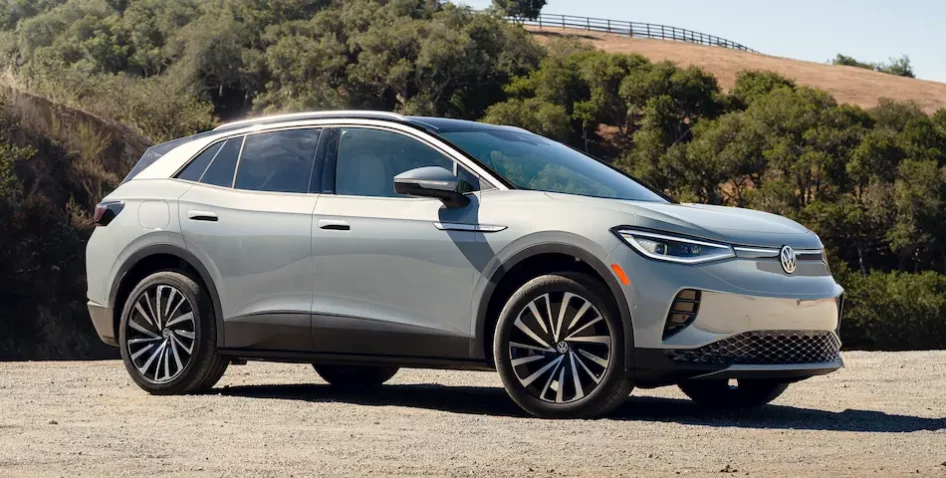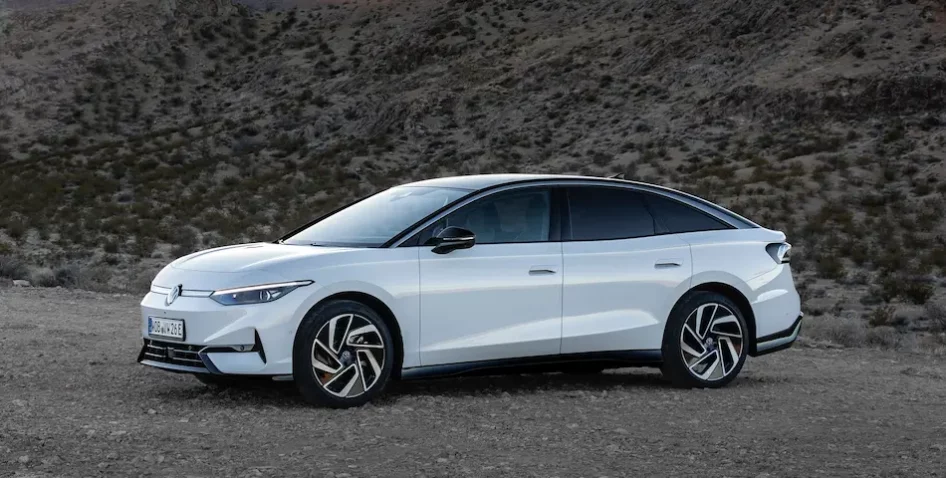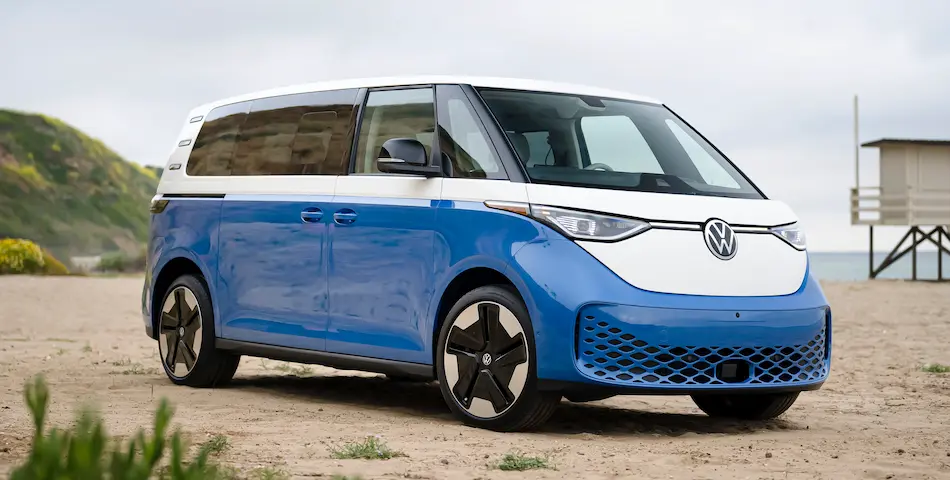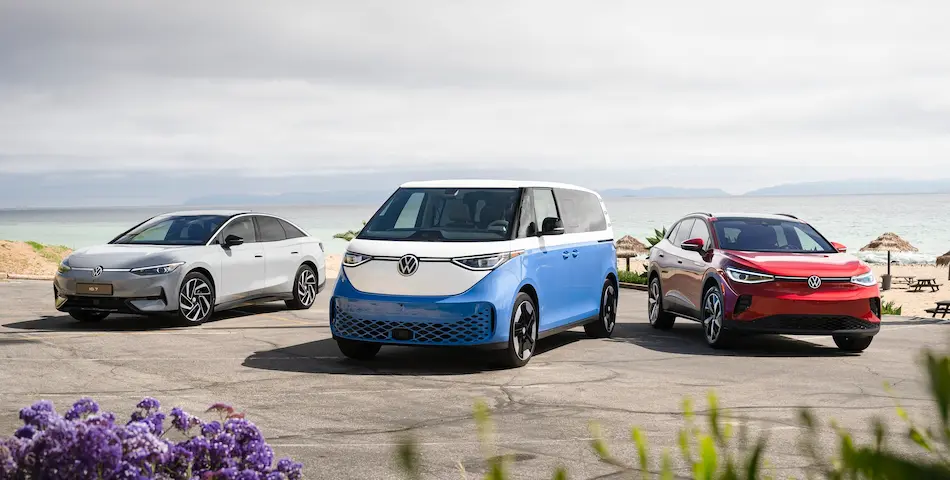Volkswagen electric vehicles represent the brand’s bold transformation from pioneering “people’s car” to leader in sustainable mobility for the modern age. With an aggressive push to rapidly expand its EV lineup with cutting-edge offerings like the ID.7 sedan and software-defined Project Trinity, Volkswagen is positioning itself as the mainstream, innovator brand democratizing electric transportation

| Volkswagen | |
| Founded: | May 28, 1937 |
| Founders: | Robert Ley, German Labour Front |
| Employees | 200,000 |
| Headquarters: | Wolfsburg, Germany |
| Manufacturing (Electric Vehicles): | Germany |
| IPO: | September, 29, 2022 (Part of Porsche IPO) |
| EV Models: | ID.4, ID.7, and ID.Buzz |
| Federal Tax Credit Eligibility: | Yes, depending on the model and options |
Volkswagen’s Vision and Mission
Volkswagen aims to lead the automotive industry’s shift to sustainable mobility through its accelerated transition to electric vehicles. The brand’s mission is to provide accessible yet innovative EVs that combine German engineering excellence with environmental responsibility.
The Evolution of Volkswagen: From People’s Car to Electric Pioneer
Volkswagen has a storied history dating back to the 1930s when it was founded to produce an affordable “people’s car.” The iconic Beetle put the brand on the map and became a cultural phenomenon. Over the decades, Volkswagen expanded its lineup to include popular models like the Golf, Jetta, and Passat. However, the 2015 “Dieselgate” emissions scandal prompted Volkswagen to shift its focus toward EVs aggressively.
Volkswagen’s first dedicated EV was the e-Golf in 2014, but the real turning point was the ID.3 hatchback in 2020, built on the company’s MEB electric platform. This paved the way for Volkswagen’s rapid electrification, including fully-electric SUVs like the ID.4 and upcoming ID. Buzz van revival. Volkswagen plans for EVs to account for 70% of its European sales and 50% in North America and China by 2030.
Volkswagen’s Current & Upcoming Electric Vehicle Lineup
Volkswagen’s EV lineup spans several segments, from compact hatches to spacious SUVs and soon, iconic van models:

ID.4
ID.4 Volkswagen’s first long-range EV SUV, the ID.4 delivers up to 291 miles of range and motor outputs from 201-335 hp. It combines sporty looks with interior space and utility.

ID.7
The upcoming ID.7 is Volkswagen’s first fully-electric sedan, slotting into the premium mid-size segment. Based on the aerodynamic ID. Aero concept, it promises a range up to 700 km (435 miles) and cutting-edge tech like an augmented reality head-up display and 38 cm (15″) central touchscreen. The ID.7 will be Volkswagen’s second MEB-based EV after the ID.4.

ID.Buzz
ID. Buzz Reviving the iconic Microbus, the ID. Buzz brings Volkswagen’s EV style to a versatile van platform with seating for up to seven. A cargo van variant is also available. It has an estimated 300-mile range.
ID.1
A compact entry-level EV is expected to join the lineup around 2025, providing an affordable way into VW electric ownership.
Electric Design and Engineering
In addition to the MEB electric architecture, Volkswagen is also developing a new and sophisticated software-driven EV architecture called Project Trinity. This new architecture is expected to be available in the second half of the decade and will enable highly automated driving and advanced mobility services. With Project Trinity, Volkswagen is looking towards the future of electric vehicles and is committed to providing cutting-edge technology to their customers.
Brand Highlights and Differentiators Performance
While prioritizing efficiency, Volkswagen aims for engaging driving dynamics through sporty dual-motor AWD powertrains.
Strategic Partnerships
VW has collaborated with leaders like Bosch, NVIDIA, and Microsoft. As a result, it develops advanced software, autonomous capabilities, and mobility services.
Manufacturing and Market Strategy
Volkswagen is establishing a comprehensive global EV production network. It includes existing plants and new dedicated facilities across Europe, North America, and China. This footprint will produce millions of software-driven EVs for worldwide markets.
Although offering premium models, VW EVs primarily target mainstream, cost-conscious buyers. These customers seek well-engineered transportation without sacrificing the latest tech. Volkswagen aims to position itself as the leading volume EV brand. It will achieve this by leveraging economies of scale, technical expertise, and brand heritage.
Challenges and Opportunities Challenges:
The electric vehicle industry faces increasing competition and other challenges. For Volkswagen, key challenges include:
- Competition from new EV startups and legacy automakers
- Strict emissions regulations requiring accelerated electrification
However, opportunities exist in:
- Tapping into urban mobility services through software-defined vehicles
- Expanding into emerging EV markets like India and Southeast Asia
- Leveraging the Volkswagen Group’s scale and R&D capabilities
Electric Driver Conclusion: Volkswagen Electric Vehicles
Rooted in its iconic past yet boldly advancing into an electrified future, Volkswagen is positioning itself as the accessible, high-tech EV brand for the masses. With cutting-edge models like the ID.7 and Trinity, VW continues innovating to democratize electric mobility worldwide.
The brand’s global manufacturing footprint, mainstream value proposition, and commitment to performance and design set the stage for Volkswagen to become a dominant force in the competitive EV market. Consequently, as it executes its aggressive electrification strategy, VW is well-poised to make its vision of sustainable mobility for all a reality.
